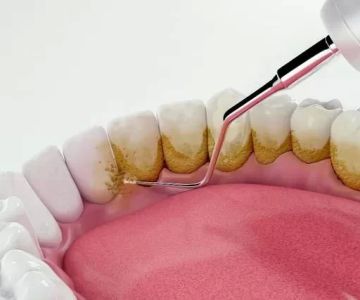Effects of Teeth Whitening on Sensitive Teeth: What You Need to Know
As someone who has always been self-conscious about the color of my teeth, I’ve been through my fair share of teeth whitening treatments. The idea of achieving a brighter smile is so appealing, but if you have sensitive teeth like I do, it can sometimes feel like a trade-off. I’ve experienced the discomfort that comes with whitening treatments, and I know firsthand how tricky it can be to navigate whitening options while dealing with tooth sensitivity. Through my experience and research, I’ve learned what to expect from teeth whitening on sensitive teeth and how to minimize the risk of discomfort.
If you're considering teeth whitening but are worried about how it might affect your sensitive teeth, you’re not alone. Many people share similar concerns, as tooth sensitivity is a common issue that can occur with teeth whitening treatments. In this article, I’ll explore the effects of teeth whitening on sensitive teeth, discuss why sensitivity occurs, and share some tips for whitening your teeth without causing unnecessary discomfort.
1. Why Do Some People Have Sensitive Teeth?
Before diving into how teeth whitening can affect sensitive teeth, it’s important to understand what causes tooth sensitivity in the first place. Tooth sensitivity can be triggered by a variety of factors, and in my case, it’s something I’ve had to manage for years. In simple terms, tooth sensitivity occurs when the tooth enamel, which protects the underlying nerve of the tooth, is worn down. This exposes the dentin, which is more porous and sensitive to temperature changes, pressure, and certain substances.
There are several reasons why teeth can become sensitive, including:
- Enamel Erosion: Over time, acids from food and beverages or aggressive brushing can wear down enamel, leading to sensitivity.
- Gum Recession: If your gums recede, the sensitive roots of your teeth can become exposed.
- Cracked Teeth or Fillings: Damaged teeth or fillings can lead to sensitivity, as the protective barrier is compromised.
- Tooth Decay: Cavities can expose the inner layers of the tooth, causing pain and discomfort.
If you have sensitive teeth, it’s important to avoid harsh whitening treatments that can exacerbate the problem. Let’s now look at how teeth whitening can affect sensitive teeth and what steps you can take to reduce discomfort.
2. How Teeth Whitening Affects Sensitive Teeth
Teeth whitening products, especially those containing hydrogen peroxide or carbamide peroxide, work by penetrating the enamel to break down stains and lighten the color of your teeth. While this process can create a beautiful, brighter smile, it can also increase sensitivity in some people. I’ve personally experienced a tingling sensation on my teeth and mild discomfort after using whitening products, which is a common side effect of the bleaching process.
The peroxide in whitening products can irritate the nerve endings inside the tooth, leading to temporary sensitivity. This sensitivity typically manifests as a sharp, quick pain when your teeth come into contact with hot, cold, or sweet substances. In my case, the discomfort wasn’t unbearable, but it was enough to make me more cautious about the type of whitening products I used.
For individuals with already sensitive teeth, the effects of whitening can be more pronounced. The extent of sensitivity can depend on several factors:
- Concentration of Whitening Agents: Products with higher concentrations of hydrogen peroxide can cause greater sensitivity, especially for people with enamel erosion or gum recession.
- Duration of Use: Prolonged exposure to whitening agents can increase the likelihood of sensitivity. For example, leaving a whitening gel on your teeth for too long can exacerbate discomfort.
- Frequency of Whitening Treatments: Frequent whitening treatments without proper care or breaks can result in ongoing sensitivity.
If you already have sensitive teeth, it’s essential to choose whitening products designed for people with this condition. Fortunately, there are ways to mitigate the side effects of teeth whitening on sensitive teeth.
3. Tips for Whitening Teeth with Sensitivity
After experiencing the effects of teeth whitening on sensitive teeth myself, I’ve found several strategies to make the process more comfortable. Here are some of the tips I’ve used that can help minimize discomfort while still achieving a bright, healthy smile:
- Choose a Whitening Product Specifically for Sensitive Teeth: There are many whitening products on the market that are formulated to be gentle on sensitive teeth. These products typically contain lower concentrations of peroxide and may include additional ingredients, such as potassium nitrate or fluoride, which help to reduce sensitivity. I found that switching to a sensitive formula significantly reduced the discomfort I experienced during the process.
- Start with a Shorter Whitening Session: Instead of using a whitening product for the full recommended time, I started with shorter sessions and gradually increased the duration as my teeth became accustomed to the treatment. This method helped minimize the irritation caused by the whitening agents.
- Take Breaks Between Whitening Sessions: Giving your teeth a break between whitening sessions can help reduce sensitivity. I spaced out my whitening treatments to avoid overexposing my teeth to the whitening agents.
- Use a Desensitizing Toothpaste: To help reduce sensitivity, I incorporated a desensitizing toothpaste into my daily routine. These toothpastes contain ingredients that block pain signals and help protect sensitive teeth. I noticed that using a desensitizing toothpaste before and after whitening sessions helped soothe my teeth and prevent discomfort.
- Follow Post-Whitening Care Instructions: After whitening, I followed my dentist’s recommendations to care for my teeth. This included avoiding very hot or cold foods for a few hours and avoiding acidic foods that could further irritate my teeth.
4. When to Seek Professional Help
While most people experience only mild sensitivity after teeth whitening, it’s important to know when to seek professional help. If your sensitivity lasts for more than a few days or becomes severe, it could indicate a more serious issue, such as tooth decay, gum recession, or other dental problems. In my case, I visited my dentist to make sure that my sensitivity wasn’t related to an underlying dental issue, and I received professional advice on how to proceed with whitening safely.
If you have concerns about teeth whitening and sensitivity, it’s always a good idea to consult with your dentist. They can recommend the best whitening options for your teeth and help you manage any discomfort that arises during the process.
Conclusion
Teeth whitening can be an effective way to brighten your smile, but if you have sensitive teeth, it’s essential to take precautions to avoid discomfort. By choosing the right whitening products, following a sensible treatment schedule, and using desensitizing products, you can achieve the smile you want without compromising your dental health. If you have concerns about sensitivity, don't hesitate to consult with your dentist to find a whitening solution that's best suited for your needs.







 Westgate Dental Arts
Westgate Dental Arts Coventry Family Dental
Coventry Family Dental Familia Dental
Familia Dental Dr. Daniel S. Fife, DDS
Dr. Daniel S. Fife, DDS Dentistry At Suburban Square: Michael I. Wollock, DMD
Dentistry At Suburban Square: Michael I. Wollock, DMD Comfort Care Dental
Comfort Care Dental The Importance of Oral Health Education During Pregnancy for a Healthy Pregnancy
The Importance of Oral Health Education During Pregnancy for a Healthy Pregnancy Why Skipping Dental Checkups Can Lead to Bigger Oral Health Problems
Why Skipping Dental Checkups Can Lead to Bigger Oral Health Problems Advantages of Porcelain Dental Restorations
Advantages of Porcelain Dental Restorations Best Tips for Brushing Your Teeth Properly for Healthy Gums: Essential Techniques for Oral Health
Best Tips for Brushing Your Teeth Properly for Healthy Gums: Essential Techniques for Oral Health How Can Diabetes Cause Tooth and Gum Problems? Preventing and Managing Oral Health Issues
How Can Diabetes Cause Tooth and Gum Problems? Preventing and Managing Oral Health Issues Healthy Habits for Promoting Good Oral Health and Hygiene: Tips for a Healthy Smile
Healthy Habits for Promoting Good Oral Health and Hygiene: Tips for a Healthy Smile